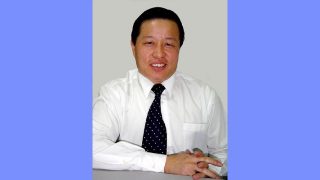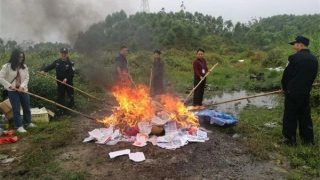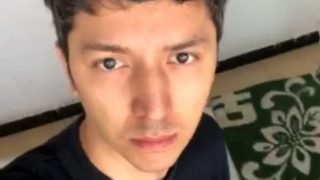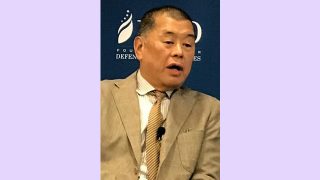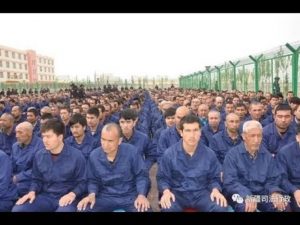
A move this week by China’s Xinjiang Uyghur Autonomous Region (XUAR) to amend a 2017 counterterrorism law to provide a legal justification for detaining as many as a million Uyghurs in political re-education camps was dismissed on Thursday as misleading and a violation of China’s constitution.
On Tuesday, the XUAR government unveiled new clauses added to an anti-extremism law put into effect in March 2017 to cover what China calls vocational training centers for Uyghurs—but which former guards and inmates describe as detention camps now estimated to hold 10 percent of all Uyghurs.
“Governments above the county level can set up education and transformation organizations and supervising departments such as vocational training centers, to educate and transform people who have been influenced by extremism,” Reuters news agency quoted one of the new clauses as saying.
The move followed mounting international criticism of China for a campaign that began in April 2017 under which Uyghurs accused of harboring “strong religious views” and “politically incorrect” ideas have been jailed or detained in re-education camps throughout the XUAR. Beijing, which initially denied the existence of such camps, now says they are part of the fight against extremism and also work to provide Uyghurs vocational training.
Uyghur exile groups, human rights experts and lawyers say the new measures do nothing to legitimize the camp system and in fact are illegal under Chinese law.
“What the Chinese (government) is doing is illegal on every front: under international law, under their own constitution, under criminal procedures, autonomy law,” said Nury Turkel, a Washington-based lawyer and Uyghur activist.
“This no more than window dressing, no more than misleading the international community, which has been rallying and criticizing the Chinese government,” he told RFA’s Uyghur Service.
The camp system has drawn criticism from the United Nations, human rights groups and the United States, where lawmakers have proposed legislation that would sanction XUAR officials for human rights abuses.
“The media scrutiny is ongoing so the Chinese have to do something to show to the world they have a so-called legal framework and their actions fall within that legal framework,” added Turkel.
“With the new amendment the Chinese government is attempting to legitimize its crimes against humanity,” he said, adding that the original 2017 counterterrorism law is “in and of itself draconian and most brutal.”
‘A mockery of law’
Dolkun Isa, president of the Munich-based World Uyghur Congress called the amendments “an attempt on the part of the Chinese government to legitimize and justify the extrajudicial detention of one million Uyghurs who have been incarcerated since the spring of 2017.”
Confronted over the camps in August at a United Nations panel in Geneva, China denied their existence, but now “has understood that it can no longer cover up the existence of the concentration camps and its crimes against humanity,” he told RFA.
In a statement on the amendments, the Uyghur Human Rights Project (UHRP) said the provisions do not address “the nature of the camps as involuntary detention centers,” nor do they “allow for the indefinite detention that is taking place in the camps.”
China’s national counter-terrorism law permits a maximum of 15 days detention without charge, the noted, meaning that those in the camps–roughly 10 percent of the Uyghur population–“are being held under arbitrary and extrajudicial detention.”
Henryk Szadziewski, a senior researcher at the UHRP, told RFA that while the amendments amount to a “flat-out admission that these camps exist” they do not legalize the program or bring it under a legitimate counterterrorism framework.
“What we can see is that the people who are targeted for this campaign are innocent people, families have been separated, and children themselves have been sent to state orphanages–these are not measures that meet any credible definition of counterterrorism,” he told RFA in an interview.
“You cannot legalize arbitrary detention and you cannot legalize enforced disappearance. This is a mockery of law.”
‘People are simply taken away’
Writing on the legal analysis website Lawfare on Thursday, George Washington University Law School professor Donald Clarke said the new amendments lack a legal basis because under the Chinese Constitution, the XUAR legislature, which passed the Oct. 9 amendments, does not have the authority to pass laws governing detention.
Only the National People’s Congress or its Standing Committee can approve such statutes, he wrote, referring to China’s largely rubber stamp parliament.
“Overwhelming evidence shows that detentions in the re-education camps are not being carried out pursuant to any such statute. There is no pretense that any of the possibly relevant substantive or procedural laws … are being applied. People are simply taken away,” wrote Clarke.
“The Xinjiang legislation does not change any of this.”
Western governments have increasingly drawn attention to re-education camps in the XUAR in recent months as media reports detail the stories of Uyghurs who have been detained in the facilities.
U.S. State Department spokesperson Heather Nauert recently said the U.S. government was “deeply troubled” by the crackdown on Uyghurs in Xinjiang, adding that “credible reports indicate that individuals sent by Chinese authorities to detention centers since April 2017 number at least in the hundreds of thousands, and possibly millions.”
Adrian Zenz, a lecturer in social research methods at the Germany-based European School of Culture and Theology, has said that some 1.1 million people are or have been detained in the re-education camps, which equates to 10 to 11 percent of the adult Muslim population of the region.
The Congressional-Executive Commission on China (CECC) a U.S. congressional advisory panel, on Wednesday issued an annual report on China’s human rights situation, calling it “dire” and on a “continued downward trajectory, by virtually every measure.”
“Of particular concern is the mass, arbitrary, internment of as many as 1 million or more Uyghurs and other Muslim ethnic minorities in “political reeducation” camps in western China,” the report said.
Senator Marco Rubio, CECC chairman, and Representative Chris Smith, cochairman of the body, said they plan to introduce the Xinjiang Uygur Human Rights Act, which would “direct U.S. resources to address gross violations of universally recognized human rights, including the mass internment of over a million Uyghurs and other predominately Muslim ethnic minorities in China and the intimidation and threats faced by U.S. citizens and legal permanent residents.”
Reported by Mamatjan Juma and Alim Seytoff for RFA’s Uyghur Service. Written by Paul Eckert.
Source: Copyright © 1998-2016, RFA. Used with the permission of Radio Free Asia, 2025 M St. NW, Suite 300, Washington DC 20036. https://www.rfa.org.
